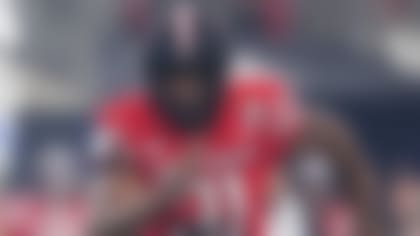General managers know better than anyone how inexact and unfair it is to rank humans. So let's turn the tables on them!
This year's list attempts to evaluate each current NFL decision maker on how he built his roster for the present and future, with past accomplishments weighed to a lesser extent. Draft record, coach hiring, free agency spending, cap management, trades and even handling of the press were all taken into consideration.
1) Howie Roseman, Philadelphia Eagles
No team does a better job using every avenue for player acquisition, balancing current needs with the future. The Jalen Hurts pick in 2020 was a great example of forward thinking that changed the course of the franchise. The top three picks in last year's draft class (Jordan Davis, Cam Jurgens and Nakobe Dean) mostly had what amounted to redshirt rookie seasons, but players selected in the class before (DeVonta Smith and Landon Dickerson) helped the team nearly win a title in 2022.
The Eagles are great at self-scouting and spend a premium on line play (Lane Johnson, Jordan Mailata and Josh Sweat) while finding ways to keep their productive longtime veterans like Fletcher Cox and Brandon Graham. Most importantly, Roseman has nailed bringing in players just about to hit their prime, such as A.J. Brown, Haason Reddick and Javon Hargrave (the latter of whom left for San Francisco this offseason). They recognize value, whether that means scooping up James Bradberry late last offseason or finding a way to keep him and Darius Slay this time around. Hurts' looming big contract will test Roseman's flexibility, but this is a front office that finds answers.
2) Brett Veach, Kansas City Chiefs
Veach won a title while re-tooling. He made the correct call to replace a foundational player in Tyreek Hill last offseason with a raft of inexpensive draft picks to build the next five years of Chiefs squads. 2022 first-rounders Trent McDuffie and George Karlaftis impacted the team's Super Bowl-winning campaign, while running back Isiah Pacheco was a revelation as a seventh-rounder. The Chiefs also let corner Charvarius Ward walk last offseason, then got significant contributions from rookies Jaylen Watson and Joshua Williams. Extracting cost-effective, excellent production out of the secondary has been part of Veach's secret sauce.
This is all made possible by Patrick Mahomes, but Veach gets credit for drafting Mahomes in 2017 in the first place. Echoing how the Patriots built a dynasty around Tom Brady, Veach hasn't been afraid to say goodbye to big names like Orlando Brown Jr., Eric Fisher, Tyrann Mathieu and Frank Clark. Veach has filled in the gaps with creative solutions, like trading for receiver Kadarius Toney last season, and forward-thinking picks, like the selection of linebacker Nick Bolton in the second round two years ago. And while Brown, again, is gone, 2021's interior offensive line overhaul (featuring free agent Joe Thuney and drafted players Creed Humphrey and Trey Smith) has aged like fine beef.
3) Duke Tobin, Cincinnati Bengals
Longtime NFL analyst Solomon Wilcots once said of Marvin Lewis that the coach “raised the Titanic” during his time in Cincinnati. That's partly why Tobin gets extra credit for building two different Bengals eras with top-shelf rosters. Having Joe Burrow instead of Andy Dalton atop the quarterback depth chart should help the latest iteration last. The team has a strong recent record with targeted free-agent strikes (Chidobe Awuzie, D.J. Reader), and it was smart not to overspend when some of their own players like Hayden Hurst and Vonn Bell got paid too much elsewhere. Tobin used that extra money to find value with tackle Orlando Brown Jr. at the top of the market and safety Nick Scott and tight end Irv Smith Jr. as worthwhile low-cost gambles. Cincinnati's offensive line overhaul last offseason mostly worked, but I love that Tobin didn't stand pat. There is strong cohesion between Tobin and Zac Taylor's coaching staff, which develops rookies like cornerback Cam Taylor-Britt before giving them playing time.
Burrow claimed back in January that the Bengals' Super Bowl window is "my whole career." Tobin is the right man to prove his quarterback correct.
4) Brandon Beane/Sean McDermott, Buffalo Bills
I don't put the Bills' inability to get over the hump on the front office. Rather, I blame it on randomness (2020 and '21) and injuries (2022). That said, the team might need to revisit the relative lack of weight that is put into offensive resources compared with McDermott's defense. A solid D can only take you so far in this era, and the team's shortcomings on the offensive line and skill positions around Josh Allen showed up in 2022.
Beane made some low-cost moves in free agency (Damien Harris, Deonte Harty, Connor McGovern) that look smart enough on paper -- they are also similar to moves from 2022 that didn't work out well. His drafts have been less inspiring over the last four years, with 2021 first-rounder Greg Rousseau being the biggest difference-maker among them. The Bills have built and maintained a superpower over the last six years since Beane was hired, but their best work was done in the building stages. Can they do it again with different players around Allen?
5) John Lynch/Kyle Shanahan, San Francisco 49ers
Former Patriots decision maker Scott Pioli used to keep a framed photo on his desk of 2000 fifth-round tight end Dave Stachelski, taken one round ahead of Tom Brady, as a reminder that the front office wasn't that smart. That's why I hesitate to give too much credit to Lynch and Shanahan for finding seventh-round gem Brock Purdy, who helped lead the team to the playoffs as a rookie quarterback last season -- although there's no denying that Shanahan understands what works in his system.
The 49ers deserve more credit for finding and maintaining so much talent everywhere else that they've thrived despite all the resources used (including first-round picks in 2022 and '23) in the 2021 trade up to draft Trey Lance, who has attempted 102 passes since. Lynch has helped find core pieces through the draft (receiver Brandon Aiyuk, safety Talanoa Hufanga), free agency (corner Charvarius Ward, defensive tackle Javon Hargrave) and trades (running back Christian McCaffrey, left tackle Trent Williams). The Niners build strength on strength and stay focused on line play, like the Eagles. That said, the offensive line could use some work in the draft.
6) Les Snead/Sean McVay, Los Angeles Rams
The problem isn't that the Rams went all in. It's that they immediately erased their flexibility after the title by signing their three biggest stars to extensions. A lot of their 2022 struggles came down to injury luck, but don't forget they were outclassed when still healthy in Week 1 and never looked right. The offensive line was a high-wire act that collapsed without Andrew Whitworth.
Reporting around the Rams' pivot to Allen Robinson after losing Von Miller in free agency last offseason suggests that McVay drove that decision and that, at least last season, his emotions could get in his way. Snead has done mostly well with the picks he has (Tutu Atwell being an exception), but the lack of draft choices and inactivity in free agency this offseason has led to a barren defensive roster. Considering the five-year run of success before this step back, Snead and McVay should still be ranked higher than general managers with little success beyond pretty offseason rosters to their names.
7) Brad Holmes, Detroit Lions
General managers sometimes peak in popularity a few years into a major rebuild. The hard part is keeping it going like Brandon Beane in Buffalo, rather than peaking too early like Steve Keim in Arizona, Dave Gettleman in Carolina or Ryan Pace in Chicago. (All Executives of the Year!) Holmes has done virtually no wrong since arriving. He preceded Dan Campbell by a week and pivoted from the Matthew Stafford era with a home run trade that helped quickly build a roster spawning the most unbridled Lions enthusiasm in memory.
Getting to use the Rams' No. 6 overall draft pick feels like a pivot point, the chance to go from fun story to real contender. After two top-shelf drafts and a smart free agency haul that focused on improving the secondary, Holmes has more than earned the benefit of the ever-present doubt in Detroit.
8) Brian Gutekunst, Green Bay Packers
This ranking feels incomplete, given that the terms of the expected Aaron Rodgers trade are not yet known, but "Gutey" is moving on from Rodgers at the right time. I believe that the Packers think Jordan Love is ready. He wasn't last year. We'll find out if Gutekunst is right -- and that will help determine Gutekunst's legacy in Green Bay more than his above-average drafts (Christian Watson!), savvy targeted free-agent pickups and mostly smart re-signings. (The extension Green Bay gave Elgton Jenkins in December already looks like a steal.) It's worth noting that the Packers have given out fewer guarantees in free agency than any NFL team this offseason, which probably won't make Love's job any easier.
9) John Schneider, Seattle Seahawks
It's great to see Schneider smiling again, even if I'm dubious about the Seahawks speed dating the draft's top prospects. Seattle's 2022 draft class could help keep Schneider smiling and employed another five years. He helped lock in two starting tackles, a top-shelf cornerback, a starting running back and two other contributors. The Seahawks' latest big-name forays into free agency (Bobby Wagner, Dre’Mont Jones) have made sense, even if the defensive line is still an issue.
Most importantly, Schneider and Pete Carroll executed one of the trades of the decade by unloading Russell Wilson for a massive haul at the perfect time, moving on from a franchise icon without having to rebuild. I'm not going to give the front office too much credit for Geno Smith's rise, seeing how he sat unsigned in free agency for more than a month last year, but the extension this year was a win-win for both sides. We'll have to see if the Seahawks ultimately replace Wilson with the Broncos' pick (No. 5 overall) they got in exchange for him, but it's been a great 12 months for Schneider regardless.
10) Jerry Jones, Dallas Cowboys
The top-shelf talent is close to the top of the league. There are homegrown Hall of Famers. After two straight years of winning, which has become a rarity in the Jerry Jones era, it's time to give this front office some credit. Perhaps the increased influence of personnel VP Will McClay and COO Stephen Jones has helped the Cowboys, who still struggle at times with self-scouting (SEE: Amari Cooper trade). Brandin Cooks and Stephon Gilmore were smart veteran acquisitions for the price, but this ranking is mostly about Dallas' consistently strong drafts that keep hitting, especially in the first round.
11) Bill Belichick, New England Patriots
As my friend Tom Curran put it, Patriots owner Robert Kraft sounds ready to hold Belichick to the same standard Belichick holds his players. The standard in New England over the last three years was average, the type of seasons we used to make fun of Jeff Fisher for. It's hard to separate Belichick The General Manager from Belichick The Coach, but that's the point. Belichick plans defensively as well as ever, knowing how to maximize a shaky cornerback group that he built. He also has no one to push back when he chooses to hire Matt Patricia as his offensive play-caller, a decision that makes it hard to evaluate Belichick's personnel moves on offense the last two years.
Belichick has enjoyed two much-needed strong drafts with at least three starters coming from each, giving this organization hope. Then again, his free-agent spending spree of 2021 resulted in more bad than good. It's an organization stuck in the middle.
12) Tom Telesco, Los Angeles Chargers
If we were basing this purely on the talent that Telesco has brought into the organization, he'd be ranked higher than this. But we also have to point out he's run the personnel department for 10 years and hired three coaches, and the Chargers' record over that time is 79-83, with a 2-3 postseason mark, despite having quality quarterback play throughout. Last year's free-agent haul didn't fix the team's run-defense problems, and the addition of Khalil Mack was a mixed bag. This offseason has been much quieter, probably in anticipation of an extension for quarterback Justin Herbert. This team looks as fun on paper as ever, but that's not a new development.
13) Eric DeCosta, Baltimore Ravens
The Ravens should have done everything in their power to sign Lamar Jackson to a long-term deal years ago, thus avoiding all this drama. They didn't, saved some money -- and will probably save more money this year if he plays on the franchise tag, which is looking increasingly likely. Frankly, it's hard to criticize either side too much in this moment without knowing how this ends, but Odell Beckham Jr.'s signing was just the type of late-free agency veteran move the Ravens have majored in. It also looks like an olive branch to Lamar, a new toy he can play with in 2023 if the two sides put off the future for another year.
This offseason was quiet otherwise, and the team remains thin on their defensive front. Ozzie Newsome made his name with great drafts. DeCosta has been average on that front, although the 2022 class holds some promise. Few teams are better at finding veterans late in the offseason to play meaningful snaps, and that skill set figures to be tested by DeCosta again because this team still feels incomplete.
14) Mickey Loomis, New Orleans Saints
The Saints entered the offseason more over the cap than any team, then proceeded to spend more money in free agency than nearly anyone else, including the acquisition of Derek Carr. And they still have plenty of cap space! I give the Saints front office credit for creatively working around the cap, using the cash Gayle Benson is willing to spend. The process isn't necessarily flawed, but the execution is. Loomis hired Dennis Allen and has stuck by him. The staff kept after Sean Payton feels stale compared with the one ex-Saints player/coach Dan Campbell put together in Detroit. Continuing to spend big on a defense in decline feels short-sighted.
The trade of Chauncey Gardner-Johnson was a total misfire, and the Saints' decision to let Marcus Williams walk while signing Tyrann Mathieu and Marcus Maye ultimately hurt. Recent drafts have major hits (Chris Olave, Alontae Taylor, Pete Werner) and some potential misses (Payton Turner, Cesar Ruiz, Trevor Penning). This is a franchise that feels a bit all over the place since the final days of Sean Payton's tenure, with everyone trying to keep the paychecks going. It's all added up to a team stuck in the middle, but damned if New Orleans doesn't make the NFL more interesting.
15) Chris Grier, Miami Dolphins
The hiring of Mike McDaniel and the acquisition of Tyreek Hill has Grier's roller-coaster tenure in Miami looking up. The top picks of the 2022 draft class were spent in trades, but the 2021 class (Jaylen Waddle, Jaelan Phillips, Jevon Holland) is good enough to make up for that. The Jalen Ramsey trade and David Long signing look like steals, although there are still questions about the offensive line. Grier may have lost valuable draft currency because of Miami's tampering with Tom Brady and Sean Payton, but there's no guarantee he'd still have a job if that plan had somehow come to fruition, with Payton taking over as head coach. So this timeline is working out pretty well for him.
16) Joe Douglas, New York Jets
Give Douglas credit for setting up a team that looks to be only a quarterback away ... while not forgetting that every quarterback decision Douglas has made thus far has been wrong, from keeping Sam Darnold for one last miserable season to drafting Zach Wilson with the second overall pick. The terms of the presumptive Aaron Rodgers trade remain to be seen, but it can be a totally sensible move and one borne of desperation at the same time.
Drafting both Rookies of the Year in 2022 -- along with Breece Hall! -- will forever be on Douglas' bio, a haul that will float the Jets for years after a couple ragged classes under Douglas. His free agency work has been strong as well, with D.J. Reed and Duane Brown among the wins. The defense is stacked and the offensive line has improved. Douglas isn't ranked higher because the team has gone 13-37 after Douglas' first three complete offseasons, but it sure looks like the Jets are ready to turn a corner.
17) Jason Licht, Tampa Bay Buccaneers
Licht came from New England, a franchise that was deathly afraid of returning the same team after winning a title. The Bucs took a different approach for two straight years. While most individual moves made sense in a vacuum, the team looked as tired as Tom Brady last season.
Not that much has changed this offseason, and the last two drafts have left this team aging even without their quarterback. The Bucs appear to be building around defense -- re-signing Lavonte David and Jamel Dean -- because they have no choice. Devin White's trade request figures to end with little accomplished, as Tampa Bay says it doesn't intend to move the linebacker. There was always going to be pain to Licht's approach, but it worked despite hanging on a year too long.
18) Chris Ballard, Indianapolis Colts
The Colts are a long way from having one of football's best rosters during the Philip Rivers season. They invested in an offensive line that atrophied. The receiving corps is below average. Most veterans acquired last offseason (Matt Ryan, Stephon Gilmore, Rodney McLeod, Yannick Ngakoue) are gone. The defensive line and Jonathan Taylor provide something to build off, but all the swinging and missing at quarterback has overshadowed some foul-tip outs elsewhere on the roster.
19) Andrew Berry, Cleveland Browns
I immediately hated the Deshaun Watson trade. The Browns went from a frisky team to a misery show, and they won't get that year of their lives back. If Watson doesn't play a lot better in 2023, Berry could be looking for another head coach or be in trouble himself despite a lot of other smart decisions.
The drafts have been solid, and Berry has a nose for wide receiver trade value. I loved the move for Elijah Moore. This roster is back to looking more complete on offense and spicier on defense, but Watson will define this organization for years and everyone knows it.
20) Trent Baalke, Jacksonville Jaguars
Baalke was with the Jaguars during the short-lived Urban Meyer era, and it's unclear how much power the GM had during that period. First-round picks Travon Walker and Devin Lloyd got off to rocky starts in 2022, but the team's hiring of Doug Pederson and spending in free agency last offseason paid immediate dividends. Who knew Christian Kirk at $17 million-per-season would age so well? Baalke's entire career going back to San Francisco has been marked by massive swings in fortune in both directions, including plenty of good times. If Baalke were only judged on last year -- ignoring all things during the Meyer debacle -- he'd be ranked higher.
21) Terry Fontenot, Atlanta Falcons
After two seasons of cleaning up the last regime's mess, it's go time for Fontenot and coach Arthur Smith. They spent huge money to retain two pieces on an offensive line that improved as a run-blocking unit in 2022. Fontenot has used the team's ample cap space to sign or trade for a lot of veterans like Jessie Bates, Jonnu Smith, Calais Campbell, Jeff Okudah, David Onyemata, Kaden Elliss and Mack Hollins, most of whom will start.
Atlanta is the most confounding team to avoid Lamar Jackson, but that decision is certainly not only up to Fontenot.
22) Ron Rivera/Martin Mayhew, Washington Commanders
Through three seasons, Rivera and Mayhew are 22-27-1 together. Their drafts have been average, at best, although Sam Howell developing into a true starting quarterback would change that. The team's best players, including most of the boffo defensive line, was acquired by the previous regime. The Carson Wentz trade was a disaster. The team has done more with less on the offensive line, which makes the big spending on mid-level free agents (Andrew Wylie and Nick Gates) surprising. Slightly worse than average is an accomplishment over the past few decades in Washington, but Rivera needs to show some progress to stick around with new ownership coming in.
23) Scott Fitterer, Carolina Panthers
It's hard to know what to make of Fitterer, who arrived a year into the Matt Rhule era. Rhule appeared to be in charge and it's unclear if Fitterer had much say in owner David Tepper's hiring of Frank Reich. The trade up for the No. 1 overall pick made sense, two years in the making after passing on Justin Fields and Mac Jones in 2021. The Panthers' drafts under Fitterer will depend on getting that pick right, Jaycee Horn's health and Ikem Ekwonu's development. The free-agent haul this season (Vonn Bell, Adam Thielen, Hayden Hurst, Miles Sanders, D.J. Chark and Shy Tuttle) was a lot more aggressive than in years past, a sign that Fitterer knows the clock is ticking.
24) Nick Caserio, Houston Texans
Caserio inherited a broken situation that got worse when Deshaun Watson asked out of town and was subsequently accused of sexual misconduct and suspended by the NFL. Caserio has hired three head coaches in his first three years as a general manager. That is a massive strike against him. I couldn't find another example of this in league history.
Caserio's first two drafts have been average for the picks he had to work with. The volume of free agents brought in over the last two years rivals any team in football, with a decent hit rate. It's up to new coach DeMeco Ryans and the incoming No. 2 overall pick to make all those moves look better.
25) George Paton, Denver Broncos
A year ago at this time, I wrote: It's easy to imagine Paton debuting on the rankings portion of this piece fairly high up a year from now. Then we watched Russell Wilson play in Denver under Paton's handpicked coach, Nathaniel Hackett, and suddenly that draft haul the Broncos gave up for Wilson looks like a killer. Paton's second draft also got off to a slow start after a great 2021 haul, but this ranking is about the Wilson trade and Hackett hire. Sean Payton is essentially in charge now.
TOO NEW
NOTE: I required a general manager to have at least two drafts completed with his current team in order to be considered for the ranking above. The seven GMs below are listed in alphabetical order.
Kwesi Adofo-Mensah, Minnesota Vikings: Managing a team in transition, Adofo-Mensah helped the Vikings win the NFC North with smart moves in free agency (Za'Darius Smith, Patrick Peterson, Harrison Phillips) and a timely trade for T.J. Hockenson. His first draft class is off to a slow start, with very little production despite four picks in the top 66. The Vikings' decision to start weaning themselves off the Kirk Cousins narcotic by passing on an extension this offseason was integral in setting up the franchise's next phase.
Ran Carthon, Tennessee Titans: The new Titans front office leader had a sterling reputation in San Francisco and holds a good press conference. He inherited an aging roster without much cap space, although the team has thus far held on to longtime cornerstones like Ryan Tannehill, Kevin Byard and Derrick Henry. I've liked the free agents Carthon has signed on the cheap (Arden Key and Azeez Al-Shaair) and it will be fascinating to see if the Titans keep drafting players that are simply bigger and stronger than other teams after the change in the front office.
Omar Khan, Pittsburgh Steelers: Former GM Kevin Colbert, who always ranked high in this piece, went out with a bang by drafting Kenny Pickett and George Pickens last April. There's not much to evaluate with Khan besides this year's free-agent crop. Cornerback Patrick Peterson and linebacker Cole Holcomb are the type of mid-market veterans the Steelers have signed in recent offseasons, and they make a lot of sense. Avoiding free agency entirely is just not a winning strategy anymore, and the Steelers recognize that.
Monti Ossenfort, Arizona Cardinals: The longtime Patriots-turned-Titans personnel man has a mission impossible. Kyler Murray is hurt. Both lines are talent-poor. Strong players (Zach Allen, Byron Murphy, J.J. Watt) are gone, with DeAndre Hopkins possibly following them out the door. The best free agent the Cardinals have signed is ... Kyzir White? Steve Keim left a nearly unwinnable hand behind.
Ryan Poles, Chicago Bears: The Bears built up a huge surplus of cap space and spent it this offseason on off-ball linebackers (Tremaine Edmunds and T.J. Edwards) and a number of low-cost veterans. They signed a lot of cheap veterans last year, too, without great success, and still have work to get to the salary floor. Poles' first draft looks solid, and the addition of D.J. Moore will help Justin Fields, whom the Bears strongly committed to by trading out of the No. 1 overall pick. Poles got a representative haul for the pick, but that's the easier part of the equation. Last year was like Poles clearing his throat. This is the most incomplete grading situation possible because Poles' legacy will depend on how he uses all the picks he's amassed. The process has made sense.
Joe Schoen, New York Giants: Schoen set low expectations after taking over a talent-poor roster last offseason ... then spent this offseason giving big money to Dave Gettleman's handpicked quarterback and slapping the tag on Saquon Barkley, with Dexter Lawrence potentially in line for a mega extension of his own. The team's improvement in 2022 was mostly because of Daboll's coaching, rather than a talent infusion, but Kayvon Thibodeaux looks like a big draft win and March's trade for Darren Waller was a smart risk-reward gambit.
Dave Ziegler, Las Vegas Raiders: Ziegler has certainly been busy since being hired with Josh McDaniels last January. Davante Adams, Jimmy Garoppolo and Chandler Jones in. Derek Carr and Darren Waller out. The roster wasn't great when Ziegler arrived, but is it any better now? Raiders owner Mark Davis seems to think Ziegler is experiencing a first-time GM learning curve.
Follow Gregg Rosenthal on Twitter.












